The Information and Education Department of the Ukrainian Orthodox Church published the translation from Greek of an interview with Metropolitan Anthony of Boryspol and Brovary to the Greek church news agency “Romfea”, which was posted on the twelfth of September, 2018.1
The Chancellor of the Ukrainian Orthodox Church Metropolitan Anthony, in his interview, spoke about the feelings triggered by the decision of the Ecumenical Patriarchate to appoint two exarchs to Kiev, in the bosom of the Ukrainian Orthodox Church, about the consequences that will arise in Ukraine as a result of the possible granting of autocephaly to the schismatics, and on the creation of a parallel Church, as well as what actions could help to avoid these dangers.
—What kind of feelings in the bosom of your Church arose, because of the recent decision of the Ecumenical Patriarchate to appoint the two exarchs to Ukraine?
—Sadness and indignation at the same time. I hope, that you have read the official statements of our Church. In the bosom of our Church, the believing people and clergy are worried, they have very serious forebodings, and are not at peace in heart. We expect the worst.
Once, in the past year or two, the Ecumenical Patriarch said in a private conversation with a Hierarch of our Church: “Do not worry, the Mother Church will never hurt her daughter!” And then, we were very thankful to the Ecumenical Patriarch, when we heard such words from him.
Now however, we are confounded, as for what reason the Patriarch changed his mind, and by his own actions wounded the body of the canonical Church in Ukraine!
Usually the Patriarch speaks very little, but every word from the Patriarchate causes a storm in the Ukrainian media. In every article, statement, comment, our Church is accused by heretics, politicians, and radicals. You must understand, that our church is under great pressure, and the Mother-Church, instead of trying to protection her daughter, is pouring gasoline2 on the fire, and by her statements and actions, promotes the enemies of the canonical Church.
—It seems that the Ecumenical Patriarchate has decided to grant autocephaly, obviously hoping to resolve the problem of schism in this way. Your Eminence, how do you see this?
—I do not know why the Ecumenical Patriarchate decided that the granting of autocephaly would heal the schism. Who told them that? We know that before treating any disease, the doctor must make the correct diagnosis. In our situation, the movement of autocephaly was the very issue that caused the schism in the early 1990s. And I don’t think it would be right to heal the disease by the cause that gave birth to it.
In our case, it seems to me that Patriarch Bartholomew has made a misdiagnosis, and continues to apply the wrong course of treatment. The persistent and stubborn attempts of the Ecumenical Patriarchate to heal the split in Ukraine, through the provision of granting autocephaly is not a cure, but poison for both the canonical Ukrainian Orthodox Church, and the entire body of Ecumenical (Universal) Orthodoxy.
It is not a mystery what will happen if Patriarch Bartholomew takes this to the end, and does not reconsider his decisions. The consequence of this step will be the poisoning of inter-Orthodox relations, as well as all of Orthodoxy. This is because, as far as we understand, the Phanar is trying to create a new, parallel “church” in Ukraine, which will consist of the current schismatics, and they, no doubt, will be the first to come to this organization, which will be declared as the future “autocephalous church”. Above all, I want to say that without exaggeration, this very idea is of a schismatic character from the very beginning.
—Why?
—Because there already exists in our country a canonical Church!3 If it did not exist, then this would be a different matter, or if we were heading into heresy, this is understandable. But so long as there is a canonical Archbishop in Kiev—this is [in our times.—Trans.] Metropolitan Onufry—and someone from the outside wants to create a parallel hierarchy, and proclaim it autocephalous, then and there he creates a schism.
The creation and existence of a parallel hierarchy is a distinctive characteristic of the schism. We already experienced and saw such a thing in Ukraine, as when Philaret did this, when he left our [canonical] Church, and created a parallel church hierarchy in relation to ours. In every city, where there is already one of our bishops, he goes and sets up one of his schismatics. If we do not call this a schism, then what is schism?
I want to give another example: the pragmatic (real/factual)4 schism between the East and the West, that is, between the Roman Catholic and Orthodox Church did not take place in 10545, when then-Patriarch Michael quarreled with Cardinal Humbert; the true schism took place during the First Crusade (1096-1099), when the Latin crusaders began to expel Orthodox Bishops in Antioch, and the Middle East in general, and put Latin Bishops in their place. It was during this period that the pragmatic6 schism happened.7
Our great bitterness, is in that Patriarch Bartholomew, with his recent actions, seems to be doing the same. He already set out on the path of schism, sending two exarchs without the permission of the local bishop—that is to say: Metropolitan Onufry—obviously [The Phanar is] possessing a readiness to create a new “church” in Ukraine; to put a new archbishop, or metropolitan, or patriarch, and a new hierarchy, and this new organization is to provide autocephaly. But this is strictly forbidden by the sacred canons!8
In order to better understand what the Ecumenical Patriarchate may want to do with us now, I will now give a comparison. Of course, comparisons are not always perfect, but they help us to better understand reality.
You have in Greece the Old Calendarists9 schism for around one hundred years. It is still not resolved. Imagine if someone from one of the Patriarchates said to you [The Church of Greece]: “If you cannot resolve it yourselves, then we will do it. So, we recognize the Old Calendarists as being the canonical church, and we will call them the Church of Greece, taking again the old style of calendar, and you—the real Church of Greece—must join them, and abandon your calendar. If you do not want this, so be it as it may, but we will give your church a new name.”
This is the very same thing they want to do with us here. Politicians, with the help of schismatics, want to rename us from the Ukrainian Orthodox Church, which we are, to the “Russian Church in Ukraine”; they want to make us out to be a foreign element. They want everything to be the opposite. The schismatics become canonical, and the canonical church to be schismatic, or at least, foreign unto its people. And the Ecumenical Patriarchate is playing on the side of the enemies of our church—and this causes us pain!
—As I understand, if this really happens, then it will create a massive scandal in Orthodoxy.
—Of course—the consequences of this step of the Ecumenical Patriarch will affect all Orthodoxy, because if one Patriarch can invade the canonical territory of a different Church, then why can’t it do this to another? [What is stopping it from doing this to another church.—Trans.] It’s no secret that there exist some dioceses between certain Local Churches that historically belonged to a [different] neighboring church, but now, with this precedent, everyone could do what he wants. Where would we go with this kind of logic? It would be a catastrophe!
—When you went to the Phanar on the 23rd of June, together with other members of the Holy Synod, were you warned by the Ecumenical Patriarch that he would act in this way?
—Not at all. This is why we were confounded, as to why Patriarch Bartholomew found the time and method to speak with the President, through whom he asked for the appeals and the signatures of heretics, but yet he did not find an opportunity to communicate with the canonical Church? As if we did not exist; as if we are the schismatics, and the canonical church is schismatic.
In addition, I know that the Local Orthodox Churches watch these unfolding events with perplexity, to see what the Ecumenical Patriarch will come to [what he will do/how far he will go.—Trans.] The Ecumenical Patriarchate cannot neglect the position of the canonical Church.
—Didn’t Constantinople recently host the Synaxis of the Hierarchs of the Ecumenical Patriarchate, where the “Ukrainian Question” was one of the main issues? How do you assess the discussion of your [Ukrainian] question in the Phanar?
—I do not know all the details of what they spoke about on this question. We can evaluate this only from what we read in the media. However, we were surprised by the fact that regarding the decision on the Ukrainian question in the Phanar, the majority of the hierarchs who spoke were among those who have never been to Ukraine, and do not have a full understanding of what is happening in our country. As we learned, the main report on the Ukrainian issue was made by a bishop from Crete, who lives in Estonia. I am referring to Vladika Marakrios of Christoupolis, and, if memory serves, if he ever even came to Ukraine it was once, a long time ago.
This lack of good knowledge and awareness of the actual [and pragmatic10] ecclesiastical situation in Ukraine was also noted by Hierarchs of the Ecumenical Patriarchate from Finland, who spoke in their interview, saying that they lacked the point of view of Ukrainian bishops, three of whom took part in the synaxis.
—What will happen in Ukraine with your Church, in the event of the granting of autocephaly to the schismatics, and what would it appear that the Phanar would do?
—Everything will be the other way around. Today’s schismatics would become an autocephalous church, and they will try to make our canonical church a foreigner for our country. Here, the Ecumenical Patriarch is compromised in the eyes of our believing people, our clergy, and our Hierarchs.
Our Church does not recognize this action, and will not serve with this new “church”. The Church is in fact a large spiritual family, which means that the majority of our believers and parishes will remain in the bosom of the canonical church, and they will not betray their pastors whom they love and follow. Some will leave, but not many, mainly just the problematic ones. Disputes will begin again in the families of Ukrainians, they will again seize our churches, brother will go against his brother, there will be conflicts. We already experienced such events in the beginning of the 1990s, when the schism occurred.
—What way out do you see from this situation; what do you suggest?
—I realize the fact that I spoke to you about very severe things. But the time of diplomacy has already passed, and we must speak openly and frankly, because this danger threatens all of Orthodoxy. In this situation, none of the Local Orthodox Churches can sit on the sidelines, reasoning and hoping that the above-mentioned events do not concern them. All Local Churches constitute the Body of the One, Holy, Catholic, and Apostolic Church. As the Apostle Paul teaches us: “And whether one member suffer, all the members suffer with it” (1 Corinthians 12:26)
It is therefore essential that all Local Churches raise their voices. It is necessary to gather the Primates, so that via dialog we can all find an answer. As the Ecumenical Patriarch said at the beginning of his meeting with Patriarch Kirill, if political leaders can solve problems amongst themselves through dialogue, how much more, then, must Church leaders use opportunities for dialogue. Moreover, our Church has a synodical [council-based.—Trans.] decision-making system.
In the history of the Church, we see that as soon as any kind of problem, heresy, or schism arose, both Local and Ecumenical Councils were convened. Therefore, in our Ukrainian case, it is necessary that we are gathered in the grace of the Holy Spirit, as we sing on Palm Sunday, and also at the time of our councils and synods. Only everyone together with prayer, having care for the good of the Church, under the guidance and enlightenment of the Holy Spirit, will we surely find a solution to the problems, and escape the great problems in the bosom of our beloved Church of Christ, where the Lord: “made you overseers11 [made us Bishops]12, to feed the Church of God, which he hath purchased with his own blood.”

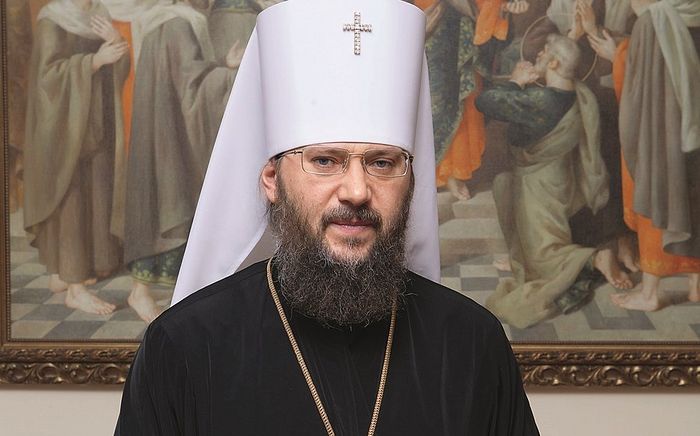
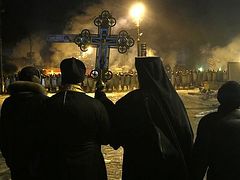
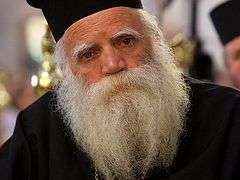
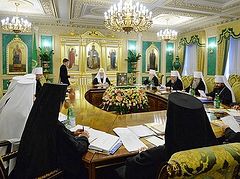
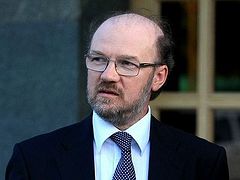
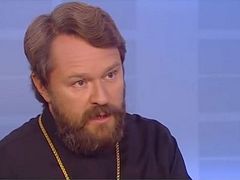
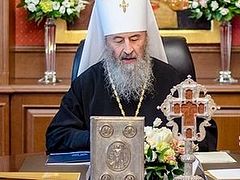
congrats on your comments. I'm liking them a lot :-)